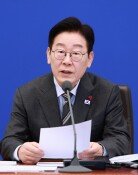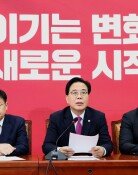Lawmakers not Above the Law
The Civic Council for a Righteous Society will file an indemnity suit with the Seoul Central District Court Thursday against 251 lawmakers for unfairly receiving salaries for June. It argues that those lawmakers have violated the National Assembly Law by failing to form a single standing committee, though the 18th National Assembly was officially inaugurated on May 30.
Each assemblyman was paid 9.01 million won last month. Factoring in 11 million won of subsidy for assembly activities and 23 million of salaries for aides, each lawmaker received over 43 million won. The combined expenses for all 251 lawmakers came to a whopping 10.8 billion won.
Of a total of 299 parliamentarians, we plan to lodge a lawsuit against 251 lawmakers, excluding 48 lawmakers who have either returned their salaries or were already sued last month, said Lee Min-jeong of the group. The return of taxpayers money is important, but what is equally so is that lawmakers are made aware that idling parliament constitutes a law violation.
Some are lashing out at lawmakers for breaking laws instead of making them. They say many lawmakers in the 18th National Assembly have breached not only the National Assembly Law by causing parliamentary disruption but also the Law on Assembly and Demonstration by joining candlelight vigil protests.
Article 5 of the National Assembly Law stipulates that the first extraordinary National Assembly session should open seven days after the new parliament officially begins its term. In effect, however, the 18th National Assembly belatedly started its operation on July 10, 41 days after the date, June 5, mandated by the law.
Article 48 of the National Assembly Law specifies that the head of each floor negotiation group should request the National Assembly Speaker to appoint standing committee members within two days after the first day of the first extraordinary National Assembly session. Even if the first day of the session is considered to be July 10, the forming of standing committees should have been completed by July 12.
The nations lawmakers have also failed to abide by Article 41 of the National Assembly Law that requires electing chairpersons of each committee within three days after the National Assembly is first convened.
Lawmakers unlawful acts arent confined to the normal operation of the parliament. Under Article 147 of the law, a member of the National Assembly isnt allowed to interrupt another members remarks. But the special parliamentary committee on the beef issue turned into chaos when lawmakers from both the ruling and opposition parties barked at each other.
Though the National Assembly was asked to hold confirmation hearings for a newly appointed Chairman of the Board of Audit and Inspection and three ministry nominees, it has yet to form special committees for the hearings. This also constitutes violations of the National Assembly Law and a law governing confirmation hearings.
Lawmakers from both the Democratic Party and the Democratic Labor Party have infringed the Law on Assembly and Demonstration by participating in illegal candlelight rallies. Some of them are even said to have assaulted riot police.
Many point out that lawmakers ill-conceived perception that they are the privileged few and the insufficient punitive measures against them are largely attributable to their repeated law-breaking. Though the National Assembly Law clearly mandates the investigation of lawmakers ethics and punishment, among 39 cases that were referred to the ethics committee in the 17th National Assembly, all cases, except for 10, were dismissed and automatically canceled when the term of the 17th National Assembly ended.
Against this backdrop, voices are growing that additional punitive measures are necessary. The Civic Council for a Righteous Society is seeking to create a clause that bars lawmakers from being paid allowances. Officials in the group argue that lawmakers should be paid only when they are assigned to standing committees.
The New Right National Union is also pushing to raise public awareness about the need for tougher punishment against lawmakers who breach laws.
The role of the National Assembly doesnt end with the enactment of legislation . Upholding various laws including the National Assembly Law that governs the operation of parliament is their basic duty, stressed Kim Yeong-rae, a politics professor at Ajou University.
koh@donga.com ditto@donga.com







